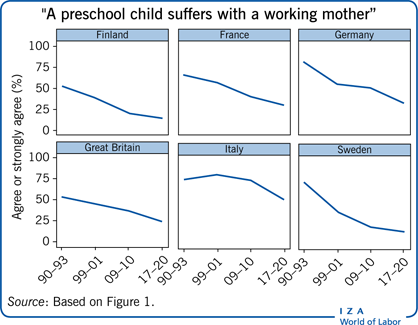Elevator pitch
There is growing agreement among parents in high-income countries that having a working mother does not harm a preschool child. Yet, research is ongoing on what the long-term effects on children are of being looked after at home (primarily by their mothers) or in childcare. Most studies find positive effects of childcare on child outcomes for children from disadvantaged backgrounds and moderate effects for children from more advantaged backgrounds. Policymakers need to improve compensation and the working environment for the sector if a high quality level is to be achieved and if the beneficial effects are to be maintained.

Key findings
Pros
Maternity leave expansions have positive effects on child outcomes compared to informal care.
Formal childcare expansions have positive effects on cognitive and non-cognitive outcomes for children from disadvantaged backgrounds.
Mothers’ time spent on engaging in parenting activities is not reduced strongly when their children attend formal childcare.
Most European countries now agree that having a working mother does not harm a preschool child.
Information provision, transparent and impartial selection criteria, and progressive fees can lower enrolment gaps.
Cons
Maternity leave expansions have little effect on child outcomes compared to formal care.
Formal childcare expansions have moderate effects on outcomes of children from advantaged backgrounds.
The quality of childcare programs matters, inadequate quality can produce negative effects.
More research is needed on ideal hours of attendance, ideal starting age, and quality level.
Large enrolment gaps exist in childcare by education level, also in settings with universal childcare.